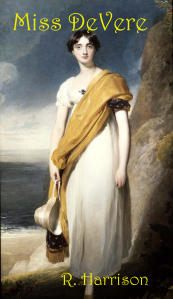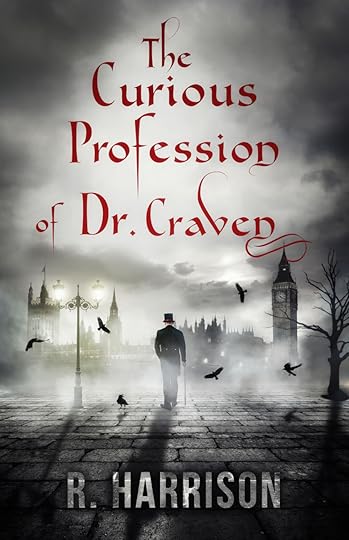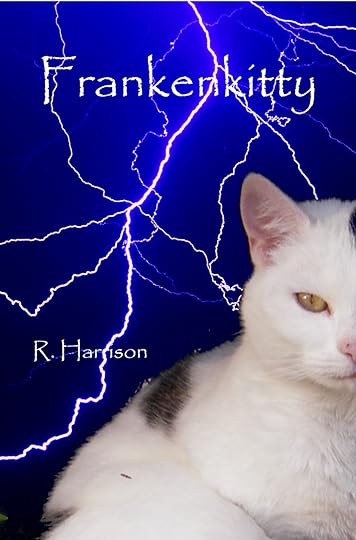R. Harrison's Blog, page 23
May 7, 2016
The Art of Deception 13 #wewriwar #amwriting
or Pride and Extreme Prejudice

Welcome to Weekend Writing Warriors. This week I continue another book, that will now won’t come out via booktrope (they’re shutting down). It’s a spy story set in late Georgian England, the year before Trafalgar. We’re following Roderick, Lord Fitzpatrick for the moment. Last week found Lord Fitzpatrick in New York as consol pro tem and landed in a sticky situation. The governor of New York, George Clinton, and his cousin the mayor of the city, summon him to make an official complaint. For what it’s worth neither Hillary nor Bill are related to George and DeWitt.
The secretary led him to a front parlour where the Governor, George Clinton, and the Mayor, his cousin DeWitt Clinton waited. George, consistent with his age and looming infirmity remained seated when Roderick entered. He was still an impressive figure, white haired and almost regal. DeWitt was younger, in his forties, and like his older cousin an experienced and skilled politician and diplomat. Both had fought in the revolution, and neither were inclined to be friendly to British interests.
DeWitt started off, “Ah, Mr Fitzpatrick, glad you could make it.”
“As His Majesty’s representative in the city what else could I do; I presume this is about the Leander.”
The older man said, “Intolerable interference with the commerce of our state and city … we saw your lot off in ’83 and will do it again.”
“I have communicated your objections to Mr Merry in Washington in an express, and will escort the diplomatic communications to London on the next packet … may I add my personal observation that our navy’s actions are stupidly and unnecessarily provocative?”
“You may, but it doesn’t matter, does it?”
Please see the other talented writers in Weekend Writing Warriors.
The Clinton’s were major politicians at the time. George Clinton was a leading light in the Democratic-Republicans (Today’s Democratic party). He came out of retirement specifically to keep Colonel Burr from becoming governor of New York. Neither of them was a fan of slavery, and their opposition to it is part of why we didn’t have a ‘President Clinton’ in 1812. They were also important factors in introducing manufacturing and technology to the Northeastern United States. Their insistence on rebuilding harbour fortifications is a major reason that the British did not burn or occupy New York in the war of 1812.
That’s DeWitt Clinton on the 1880 thousand dollar bill.
Booktrope shuts it’s doors May 31. This opens a whole slew of questions, including whether to return to an earlier pen-name (R. Harrison being dead common.) It also means that come June 1, the current version of “The curious profession of dr Craven.” will be unavailable. I will get the rights back without trouble. (Although there are issues about ‘creative teams’ that still need to be settled.)
I’ve also released a sweet regency romance, Miss DeVere  This is a fun read, and unlike “The curious profession of dr craven
This is a fun read, and unlike “The curious profession of dr craven  ” seems to not carry a curse. However, Dr Craven is on sale this week.
” seems to not carry a curse. However, Dr Craven is on sale this week.
Frankenkitty is available.
 What happens when teenagers get to play with Dr Frankenstien’s lab notebooks, a few odd chemicals and a great big whopping coil? Mayhem, and possibly an invitation to the Transylvanian Neuroscience Summer School.
What happens when teenagers get to play with Dr Frankenstien’s lab notebooks, a few odd chemicals and a great big whopping coil? Mayhem, and possibly an invitation to the Transylvanian Neuroscience Summer School.


May 6, 2016
My Writing Space. #LifeBooksWriting
Since my fiction writing occurs wherever I can set my laptop, I don’t really have a place. So I thought I’d show you what a professor’s office looks like. The featured photograph shows my five year report. Professional writings, both for courses and papers, in two binders.

Three monitors for three computers. All running various calculations. Two are Linux boxes.

The mandatory bookshelf, full. Chemistry, security, languages and machine learning. The boxes at the bottom are left over from our hackathon. There’s a can of coffee, the necessary black bean on one shelf.
At home I write with tea and cats.


Song to Celia
Ben Jonson, 1572 – 1637
Drinke to me, onely, with thine eyes,
And I will pledge with mine;
Or leave a kisse but in the cup,
And Ile not looke for wine.
The thirst, that from the soule doth rise,
Doth aske a drinke divine:
But might I of Jove’s Nectar sup,
I would not change for thine.
I sent thee, late, a rosie wreath,
Not so much honoring thee,
As giving it a hope, that there
It could not withered bee.
But thou thereon did’st onely breath,
And sent’st it back to mee:
Since when it growes, and smells, I sweare,
Not of it selfe, but thee.


May 5, 2016
The Crocodile
Lewis Carroll, 1832 – 1898
How doth the little crocodile
Improve his shining tail,
And pour the waters of the Nile
On every golden scale!
How cheerfully he seems to grin,
How neatly spreads his claws,
And welcomes little fishes in,
With gently smiling jaws!


May 4, 2016
The Snail
William Cowper, 1731 – 1800
To grass, or leaf, or fruit, or wall,
The snail sticks close, nor fears to fall,
As if he grew there, house and all
Together.
Within that house secure he hides,
When danger imminent betides
Of storm, or other harm besides
Of weather.
Give but his horns the slightest touch,
His self-collecting power is such,
He shrinks into his house, with much
Displeasure.
Where’er he dwells, he dwells alone,
Except himself has chattels none,
Well satisfied to be his own
Whole treasure.
Thus, hermit-like, his life he leads,
Nor partner of his banquet needs,
And if he meets one, only feeds
The faster.
Who seeks him must be worse than blind,
(He and his house are so combin’d)
If, finding it, he fails to find
Its master.


May 3, 2016
A Dream Within a Dream
Edgar Allan Poe, 1809 – 1849
Take this kiss upon the brow!
And, in parting from you now,
Thus much let me avow:
You are not wrong who deem
That my days have been a dream;
Yet if hope has flown away
In a night, or in a day,
In a vision, or in none,
Is it therefore the less gone?
All that we see or seem
Is but a dream within a dream.
I stand amid the roar
Of a surf-tormented shore,
And I hold within my hand
Grains of the golden sand–
How few! yet how they creep
Through my fingers to the deep,
While I weep–while I weep!
O God! can I not grasp
Them with a tighter clasp?
O God! can I not save


May 2, 2016
What’s the railroad to me?
Henry David Thoreau, 1817 – 1862
What’s the railroad to me?
I never go to see
Where it ends.
It fills a few hollows,
And makes banks for the swallows,
It sets the sand a-blowing,
And the blackberries a-growing.

This image, from shorpy, shows the Penmar train station at the start of the 20th century. The Appalachian trail runs through there now, and it’s well-covered in forest. Somehow I think Thoreau would approve of the change.


April 30, 2016
The Art of Deception 12 #wewriwar #amwriting
or Pride and Extreme Prejudice

Welcome to Weekend Writing Warriors. This week I continue another book, that will now won’t come out via booktrope (they’re shutting down). It’s a spy story set in late Georgian England, the year before Trafalgar. We’re following Roderick, Lord Fitzpatrick for the moment. Last week described the immediate consequences of his practical abolitionism. He’s in New York this week, having fled Washington. Unfortunately the British consul has decamped with a local beauty and instead of taking his ease while waiting the monthly packet, he is pressed into service. He’s also been landed dab in the middle of a diplomatic crisis brought about by an overzealous Captain. He’s dressing down a midshipsman in this section.
“What was your Captain thinking? Assuming he is capable of thought. Chasing a merchantman into New York harbour and then firing on her; let alone killing the helmsman – a Mr Pierce. There were riots in the streets yesterday.”
“She didn’t stop when we hailed her … the ball hit a different ship, the sloop Richard.”
Roderick rose and escorted the young sailor to the front window of the British Consul’s house in Brooklyn; the tip of Manhattan was visible, across the river, “Do you see that? The battery … the blasted Jonathans are rebuilding it … all the harbour defences … it’s now only a matter of time before we’re at war.”
The midshipman nodded, “How many guns?”
Roderick said, “It’s in the letter ;I know he won’t but I’m demanding that Captain Whitby leave; he’s causing more harm to the crown by stopping ships than the contraband he confiscates could ever do; you’re already banned from resupplying in any United States port.”
“Halifax isn’t far.”
Roderick quietly ground his teeth in frustration, “Why couldn’t the admiralty see that they were driving the American’s straight into the willing arms of the French? “
Please see the other talented writers in Weekend Writing Warriors.
The date is shifted, but they are discussing the Leander affair. The British Navy stationed two warships outside New York harbor and intercepted American merchant ships. The ships were searched for contraband and often taken to Halifax as prizes. Eventually even the tax-averse Democratic-Republicans had to rebuild the navy and chase them away. Roderick is right, war with the Americans was only a matter of time after that.
Booktrope shuts it’s doors May 31. This opens a whole slew of questions, including whether to return to an earlier pen-name (R. Harrison being dead common.) It also means that come June 1, the current version of “The curious profession of dr Craven.” will be unavailable. I will get the rights back without trouble.
I’ve also released a sweet regency romance, Miss DeVere  This is a fun read, and unlike “The curious profession of dr craven
This is a fun read, and unlike “The curious profession of dr craven  ” seems to not carry a curse. However, Dr Craven is on sale this week.
” seems to not carry a curse. However, Dr Craven is on sale this week.
Frankenkitty is available.
 What happens when teenagers get to play with Dr Frankenstien’s lab notebooks, a few odd chemicals and a great big whopping coil? Mayhem, and possibly an invitation to the Transylvanian Neuroscience Summer School.
What happens when teenagers get to play with Dr Frankenstien’s lab notebooks, a few odd chemicals and a great big whopping coil? Mayhem, and possibly an invitation to the Transylvanian Neuroscience Summer School.
Fort Pulaski, shown as the cover image, is a third generation coastal defense fort. I don’t have any pictures of Battery Park or Fort McHenry in Baltimore, which are second generation forts built at the time of the story.


April 29, 2016
A Formulaic Romance, Chapter 5. #amwriting #wip #romancenovel #fridayreads
Mr Oliver or Harding or whatever has his revenge in this chapter. Armed with a barely legal warrant, he and General Byng search the hall, trashing it in the process. To make matters worse, George’s fiancee shows up. She’s worried about him and brings along his mother, the redoubtable Lady Beddlington. Lady Beddlington does not approve of Rachel.
It continues from the previous chapter, or you can start from the beginning.
My co-author Amelia and I often put the beginnings of books on my, now our, blog. They don’t always make it to the end, but it’s helpful for our writing. This is another Regency Romance. This time without grave robbing or financial dealing and legal chicanery.
Consequences.
George’s confidence about seeing the last of Mr Oliver was sadly misplaced. The door knocker banged early in the morning, echoing through the house. Mr Brindle hurried to answer.
A man in a General’s uniform spoke, “Took you long enough.” He stood with a small squad of men and more importantly, Mr Oliver.
“Sir?”
“Call your master.”
“As you desire. Would you care to wait in the hall?”
“No. We’ll stay here.”
“As you wish. I shall summon Lord Hartshorne.” Mr Brindle turned and entered the building. Unfortunately it meant that he missed seeing the General motion to his soldiers. The squad double-timed as they placed guards at all of the doors and in places where they could watch the ground floor windows.
A minute later Mr Brindle shuffled into the parlour where Rachel was breakfasting, “Ma’am.”
“Yes?”
“There are some gentlemen at the front door, Ma’am.”
“What about them?”
“They desire to see Lord Hartshorne, and I thought it best if you were aware. It might … be useful to have you there.”
A bleary-eyed and hastily dressed Rupert stumbled outside fifteen minutes later followed by Rachel and George. “Good morning General Byng,” he said, “What brings you to Oulten Hall so early on such a fine day?”
“Nothing good My Lord. Information has been laid that you are in possession of a large amount of explosive material. Unauthorized and illegal possession, I might add.”
Rupert scanned the men who remained in front. Mr Oliver was grinning. Rupert said, “Stuff and nonsense.”
“We shall see. Put it to the test with a search. Can’t have the revolutionaries getting their grubby hands on explosives. Bad enough if they have pitchforks and shotguns.”
“No you won’t.”
“I’m afraid this.” General Byng produced a sheet of paper that was adorned with a seal, “this is a search warrant. Not that we need it, but best to obey the formalities. Stand aside, Sir, while we search your dwelling.”
George demanded, “Let me see it.”
General Byng nodded to a soldier and with that, the man carried the document to him. George scanned it. “It’s not legal. Sir John should-”
Legal or not, George’s pronouncement had little effect. General Byng nodded to his command and was followed by the men when he charged inside. Mr Oliver gave George a slight bow, smiled at Rachel and followed. The men made their way from room to room, leaving little intact. The stuffed animals, mostly intact, joined piles of books, papers and journals in haphazard chaos on the floor in the library. The destruction was near total. Only the skeleton in the corner stood, though he was shorn of his drapery.
One of the soldiers said to General Byng, “Not here, Sir.”
“Next room then.”
Seizing Rupert’s small sample of sodium from the shelf in the parlour, one of the men dumped the oil on the floor. Thinking it valuable, he put the metal in his pocket. He then discovered the hard way, when his trousers caught fire, that sodium was not to be held close to delicate areas. Heading off their intention to quench the fire with a jug of water, Rupert managed to retrieve the metal before either the trousers or the man was burned too badly.
Rupert interrupted General Byng, “If you would tell me what you are looking for, I might save this destruction.”
“We’ll known when we find it.”
“So the destruction is the purpose of this search?”
“You might say that, but I’ll deny it.” There being little else to tear apart, they moved on to the next room. Screams echoed up from downstairs. Rupert’s cook defended her domain with more ferocity than her looks suggested.
Eventually the path of destruction wended its way to the Rupert’s workshop. Rupert stood in the door, blocking it. “No. Please. There are things in here that.’
His objections were of little avail. His next words, “Are dangerous if not handled right,” were ignored.
General Byng laughed, “Move him aside, Lad’s. If it’s not here, then he’s clean.”
Rupert struggled against the two men who held him while the rest filed in and started tearing his laboratory apart.
Meanwhile, Mr Oliver sidled up to George and Rachel. He drew a quiet breath, and expressed his unctuous concern, “Would have been cheaper to settle you know. Easier.”
“Never. You’ll hear from my solicitor, and Lord Hartshorne’s one.”
“Fat lot of good that’ll do you. M’Lord. I have Lord Sidmouth’s ear. The shining golden boy who can do no wrong, I am. Especially when there are so many dangerous reformers loose in the countryside.”
Rachel spat, “At least for the moment.”
Mr Oliver gave her a stiff bow. “That’s all it will take. Ma’am.”
An explosion, followed by screams, interrupted their conversation. Not that it was a flowing or enjoyable one in any case. One of the soldiers found a small box, labelled, “Explosive, do not disturb.”
It contained samples of Oxymuriate of Potash mixed with flowers of Sulphur, and various similar fulminating or detonating mixtures. Chemicals that would ignite or explode with little provocation.
He shouted, “Here Sir, we’ve got it,” to General Byng.
“Open it and see.”
Rupert tried one last time to intervene for their safety. He shouted, “Please don’t. It contains sample detonators. A long term study of their stability. They could.”
It was too late. The soldier opened the box and picked up one of the fulminates. It still worked three years after Rupert had made it. Unfortunately, it was more sensitive than the original preparation and blew the man’s hand to shreds when he handled it roughly and held it up.
Years of war had inured General Byng to wounds and screams. He turned to the men holding Rupert and said, “He’s under arrest. We’ve found what we need.” Then he turned to the others and said, “See what you can do for poor Lewis, and have that man be quiet. Poor discipline.”
The men frog-marched Rupert off to await his trial. Red drops of blood showed where Lewis walked as he limped after them.
Rachel looked at the destruction, watched the men escort Rupert off, and started to sob. Quietly, but definitely.
George patted her, perhaps too familiarly, on the back and then said, “I’ll follow them. See what I can do. Habeas Corpus is still in effect, despite what General Byng says. I’ll find a magistrate.”
“You will?”
“Yes, now dry those tears. Keep busy and try not to worry. You know and I know this was a low attempt at revenge. It will be fine. Worse comes to worse, I’ll send an express to the General’s cousin Poodle. He’s well connected, something to do with the F.O.”
Rachel nodded her agreement. George headed for the stables, which consistent with his statement about revenge, were untouched. Even though they’d be an excellent place to store explosive compounds or gunpowder.
Rachel headed for the library. She would start on the books. Unlike many of the servants, she could easily read the titles.
****
Rachel was standing in the diminishing pile of books, like Dido in the remains of a literary Carthage, when a carriage pulled up outside of the Hall late in the afternoon. While the maids and footmen had repaired much of the damage, the chaos of the morning was still evident when two stylish women strode into the library, leaving their servants to handle the mundane details. The elder of the two, a ferocious looking woman in her middle years, snapped her fingers and said, “Tea,” before she dusted off a chair and sat down, rigid in her disapproval. The other, an elegantly dressed young woman who was close to Rachel’s age, added, “What are you waiting for? Tea. It was a tedious journey and we are in need of refreshment.”
Seeing that the bell pull was still torn from its wire and feeling the desperate need for a change of scene Rachel left them and found Mrs Hobbes. “If it wouldn’t be too much trouble, Mrs Hobbes, our visitors would like tea … in the library. Are there still three cups intact?”
Despite the carnage that lay around them, Mrs Hobbes retained her humour. She smiled when she said, “Not from the best set, Ma’am, but they’ll do for this company.”
“Thank you.” Rachel returned to the library and continued restoring books to their shelves. She picked up the first of several bound notebooks. They were in Rupert’s hand, his laboratory notes; copied gracefully and clearly so that his experiments could be repeated. While she studied them, wondering what he meant by Sal. Nat. or Cinnabar and nitric spirits or for that matter what it meant to reflux, Mrs Hobbes came in with the tea tray. She put it on a table, then quietly bowed to the two women. “Ma’am,” she said to Rachel, “your tea.”
“Thank you Mrs Hobbes.”
Rachel sat across from the two women and poured the tea. “I’ll be mother.”
The older one, her brown hair starting to be streaked with grey, and wearing the minimal bonnet of a dowager on the make, frowned, “A servant, drinking tea with her betters. Rupert must learn to enforce proper deference in his people.”
The other one, much prettier and younger, with blonde hair, an elegant necklace, and a fine lace collar above her muslins added, “Lady Beddlington, I’m sure she could use the refreshment. We must excuse excesses when there has clearly been a cataclysm of no small magnitude. Whatever happened here?”
Rachel inspected them, “Lady Beddlington? George’s mother … and you must be Miss Deacon. I’m Lady Hayforth. I’m so pleased to meet you. We’re soon to be related.”
“We are?”
“I suppose, well with the short time, and … this upset. Rupert hasn’t had time to compose a letter. But”
“Oh My Lord, you’re not engaged to my grandson?”
“We haven’t negotiated the settlements yet, but yes. Rupert offered me his hand, and I accepted the honour … with great pleasure. It’s made both of us so happy.”
Lady Beddlington put her face in her hands. A minute later, when she finally had composed herself, she raised it to confront Rachel and say. “Where is my foolish grandson?”
“And my fiancé for that matter?”
“I wish I could tell you. General Byng’s men searched the Hall this morning. They took Lord Hartshorne away and George followed them to see what he could do.”
“I wish you would not be so familiar with my fiancé Ma’am.”
“I apologize, Miss Deacon, but he asked me to call him that … as a friend.”
“As a friend? Most unsuitable. I shall have to remind my dearest to keep his distance. It’s a besetting sin of his.”
“I’d say it’s charming. May I ask why you’re here? We were hoping to travel to London soon. My cousin, Lord Bromley, expects me.”
“George, I mean Lord Beddlington didn’t say anything about you or you and Lord Hartshorne in his last letter. I can see why.”
“Miss Deacon … as much as I count your fiancé as a friend, he is simply that, a friend.” Only a friend, yes, only a friend. “If you’re concerned, my companion, Miss Holloway can reassure you on that point.”
“You have a companion? Here.”
“Of course. I was on my way to stay with my cousin, for the season, when my carriage broke. Lord Hartshorne graciously,” Not so graciously at first, “offered us shelter.”
“That wretched pile, on the main road, was that your carriage?”
“Unfortunately, yes. I think our plan is to take Lord Hartshorne’s carriage. At least I hope it is, because his is incomparably nicer.” Rachel smiled at the thought.
“Dirty dishes!” Lady Beddlington leaned forward and exploded, “You baggage, you adventuress. Attaching yourself to my grandson. I’ll see that you don’t wed him.”
Rachel bit her tongue to avoid rising to the argument. Instead of giving Lady Beddlington a piece of her mind, she rose, stiffly, and after nodding to her said, “I must see to these books, Ma’am. These,” she pointed at the bound notebooks, “are his laboratory notes. I’m sure he’s most worried about them, and one seems to be missing.”
Eventually, tired of being ignored and of enduring her intended mother-in-law’s sputtering temper, while equally curious about the contents of Lord Hartshorne’s library, Miss Deacon rose. She knelt beside Rachel and said, “May I help?”
“Thank you, I’d love help. I’ve been sorting the books by author.” She pointed to the piles, “It’s a long process.”
“I see.” Miss Deacon picked up the ill-fated volume of Kant’s critique. “This is in the original German. I received Geo- Lord Beddlington’s answers to my questions. Most insightful. I didn’t know he had it in him, not to mention that he could read academic German … what are you sniggering at?”
“Nothing. He and Rupert, um, they worked together on your questions.”
“Oh. At least he was improving his mind.”
Lady Beddlington fiddled with her reticule, pulled out her fan, opened it and fanned herself, then shut it with an echoing snap. “Cha- Miss Deacon, I am distressed sitting here. Escort me to my room. I have a headache.”
“Yes, Lady Beddlington,” Charity started to rise, but Rachel was quicker. She curtsied, “My Lady, let me call my companion, Miss Holloway. She’s an excellent nurse and very skilled at relieving headaches.” Poor Lucy. Lady Beddlington started to object, so Rachel continued, “I should so much like to know Miss Deacon better.”
“Maybe you’re right … Miss Deacon do not over tax yourself. Remember you’re not strong.”
“Yes, Ma’am.”
“If you’ll let me assist you.” Rachel added, “I’ll help you to the hallway and we’ll find my companion.”
A few minutes later, having safely delivered Lady Beddlington to Lucy’s care, Rachel returned. She asked, “What did Lady Beddlington mean by ‘you’re not strong?’ You seem healthy to me.”
“I don’t know. Maybe she thinks Geor- Lord Beddlington would enjoy a languid wife.”
“The George,” Rachel saw Miss Deacon stiffen, “The George I know wouldn’t. Let’s not pull caps, we should be cater-cousins. May I call you Charity? Much nicer name than mine, Rachel.”
“Ewe may.”
“Thank you.”
“I punned just then. Did you catch it?” Charity saw from Rachel’s confused expression that she didn’t. “The word Rachel means ewe, or ewe-lamb.”
Once the joke was explained to her, Rachel laughed, “I’m even gladder now that my father didn’t pick Delilah or Jael. No scholar, He just read the Old Testament to find one he liked – thought it would demonstrate his piety. Not that he really had any.”
“Delilah’s queen of the night and Jael mountain goat.”
“Then I guess Rachel’s not too bad of a name. Charity, at least that’s an English word.”
“Don’t you know Hebrew?”
“No. My education rose to Fordyce’s sermons and the house books. No more.”
“Poor girl. I’m helping George, my George, to remedy the defects in his education. Would you like to join us?”
“Very much.”
****
Supper was over by the time George and Rupert returned from General Byng’s camp. They stumbled into the front parlour, tired and dishevelled. Definitely in need of a restorative brandy, or two, or maybe three.
George was the first to speak, “Charity?”
“I was worried, you didn’t write.”
“I did, and we were planning to return to the village soon. Sorry if I missed a day or two with the excitement, but you mustn’t worry.”
“Four days.”
“That can’t be. I just sent you my answers to your questions about Kant’s philosophy.”
“Your answers? I heard that Lord Hartshorne helped you, practically wrote the answers for you.”
Lady Beddlington added her mite as well, “Your conduct has been most unsatisfactory, George. The Hall a mess and I find my grandson engaged to be married to an adventuress.”
“She’s not an adventuress, Mother. She’s a,” he caught himself before he said lovely, “well-behaved young woman who will be a credit to our family.”
“I’m surprised and upset. Why Miss Deacon could be within her rights … I mean keeping such low company and encouraging your nephew.”
George could see Rachel’s face whiten at the implied insults. Rupert missed it. Still he said the right things, “I say, you’ve done a fantastic job putting things to right Rachel. It can’t have been easy.”
“It wasn’t, but you really should thank Miss Holloway and Mrs Hobbes. I put books away in the library, with Charity’s help.”
Charity smiled at Rupert, “What an impressive collection you have, and they were read, the spines cracked.”
“Of course, what good’s a book if you don’t read it?”
“That reminds me,” Rachel said, “It looked like one of your notebooks was missing. I found a volume 8 and volume 10, but no volume 9.”
“Really? That’s odd. Must have been misplaced. Look for it in the morning. George, I know it’s not done, but I feel the need of something stronger than tea. Then if Miss Holloway and Lady Hayforth are able to accompany us, I should like to look at the stars. There were some moments today when I wasn’t sure I’d see them again.”
George laughed, “Gas, O yea of little faith, trust your Uncle Beddlington to fix things. I won’t say no to that restorative.”
Charity’s gaze glanced from Rupert to George to Rachel and then back to Rupert. “I’d like to see the stars too.”
April 28, 2016
Assault
Edna St. Vincent Millay, 1892 – 1950
I had forgotten how the frogs must sound
After a year of silence, else I think
I should not so have ventured forth alone
At dusk upon this unfrequented road.
I am waylaid by Beauty. Who will walk
Between me and the crying of the frogs?
Oh, savage Beauty, suffer me to pass,
That am a timid woman, on her way
From one house to another!








